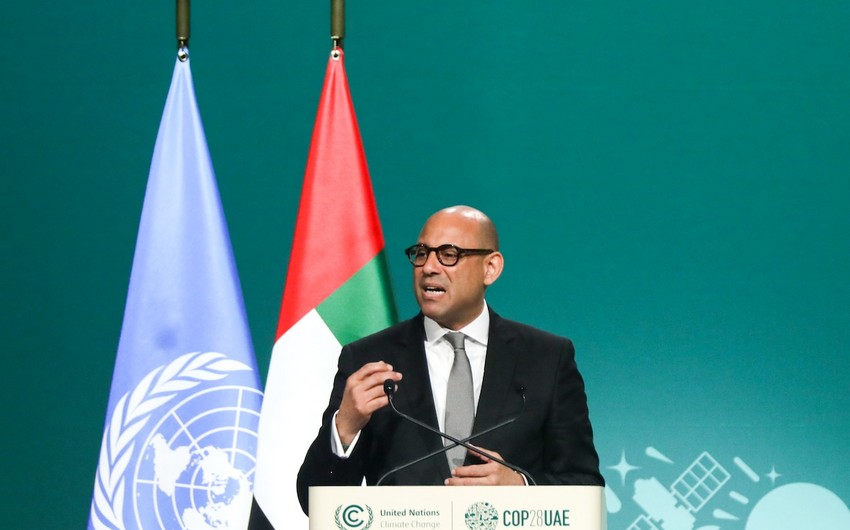The Conference of the Parties to the UN Framework Convention on Climate Change, the 29th session of which (COP29) will be held in November 2024 in Baku, is a critical event in the climate ambition cycle, the Executive Secretary of the UN Framework Convention on Climate Change, Simon Stiell, said during his speech at the ADA University in Baku, Report informs.
“We must spend the year working collectively to evolve our global financial system so it’s fit-for-purpose, with a clear plan to meaningfully execute the climate transition,” Simon Stiell said.
Stiell noted that it is both an honor and a huge undertaking and responsibility to serve as host and Presidency-Designate of a COP.
“I have been very encouraged by the constructive and thoughtful discussions we have had so far this year, and in particular in recent days here in Baku,” he added.
According to him, a willingness to take on the hard work of driving large-scale change is absolutely essential. Because the time has passed for business-as-usual, in all aspects of the world’s climate fight.
Stiell suggested starting in 2050, imagining what the world will look like if we do succeed in both limiting global warming to 1.5°C and protecting all peoples from climate change impacts.
“Of course, it will be no utopia… Global energy systems are at net-zero emissions. Countries – or at least regions – will largely be energy self-sufficient. Renewables have made energy accessible, affordable and predictable for all. That means we avoid the shocks and inequalities that have shaped economic trends and conflicts in the past,” he noted.
According to the UN Climate Change Executive Secretary, the trillions previously spent on fossil fuel subsidies will be available for better purposes: health care, education, safety nets for those who fall behind.
By keeping temperature rises to 1.5°C, going outside in major cities will no longer be dangerous due to air pollution, saving millions of lives every year.
“I want to make one thing clear: this vision is not bright-eyed wishful thinking. It is reflected across the full gamut of the Paris Agreement and in agreements negotiated line-by-line, word-by-word, comma-by-comma, at subsequent UN climate conferences. It is neither utopian nor dystopian. It is utilitarian, pragmatic and achievable, based on existing but not yet fully scaled technologies and implemented policies,” Stiell stressed.
Speaking about the forecast for 2030, he emphasized that global emissions could be reduced by 43%.
Renewable energy will be abundant and affordable, including in developing countries, delivering fully on the COP28 agreement to triple renewables.
“We have broken the investment cycle in fossil fuels. Economies have diversified, their individual pathways away from fossil fuel production are creating more jobs, stronger supply chains and more stable economic growth. Methane emissions are negligible, through simple but rapid action across all industries,” Simon Stiell said.
The UN Climate Change Executive Secretary added that The Loss and Damage fund will rapidly respond where losses and damages are occurring – demonstrating that innovative approaches – such as the Transitional Committee established by UN Climate Change after COP27 – can yield real-world results.
Then, Simon Stiell shared his views on what will happen in 2025:
“Earlier in the year, all countries put forward a new national climate plan – these Nationally Determined Contributions, or NDCs version 3.0 – are markedly different from those that went before. For starters, their pledges are 1.5-aligned, they cover every greenhouse gas, and they lay out how each sector of the economy will transition. Secondly, they address how each country contributes to the outcomes of the Global Stocktake of 2023,” he noted.
According to him, The United States, China, Russia, Brazil, Indonesia, Germany, India, the United Kingdom, Japan, Canada, France, Australia, Argentina, Mexico, South Africa, Italy, South Korea, Saudi Arabia, the European Union and Türkiye as the G20 – together responsible for 80% of the world’s emissions in 2025 – will have seriously re-engineered their targets on this basis.
“Because they know that PR spin, re-branding or tinkering around the edges won’t cut it to meet their climate responsibilities, and that it would also leave them badly behind the innovation curve, not at the cutting edge. These national climate plans aren’t just pieces of paper, they must be backed by robust policy instruments, costed out and translatable into shovel-ready investment opportunities,” Stiell said.
According to his forecast, every country will have delivered a National Adaptation Plan – simply speaking – a resilience plan for each country to protect its people, their livelihoods, and nature from spiralling climate impacts.
“During 2025, UN Climate Change has produced a report, synthesizing the Biennial Transparency Reports submitted before the end of 2024. This report is a significant milestone – the first progress report from countries on their implementation of the Paris Agreement since its adoption 9 years previous. Bold climate action must be mainstreamed across all functions of government and all aspects of business and investment, with public and private sectors working in concert, together with communities and experts, leaving no one behind,” Stiell noted.
Speaking about the forecast for 2024, the expert emphasized that funds are needed to implement the climate transition:
“$2.4 trillion, if not more. $2.4 trillion is what the High-Level Expert Group on Climate Finance estimates is needed every year to invest in renewable energy, adaptation, and other climate-related issues in developing countries, excluding China.”
He noted that in fact, without far more finance, 2023’s climate wins will quickly fizzle away into more empty promises. 2024 is the year multi-lateral development banks must demonstrate - with concrete actions - their centrality in the world’s climate fight, and their determination to deliver impact at scale.


 https://static.report.az/photo/1a6eb0c9-3731-3e58-99b6-90299892c923.jpg
https://static.report.az/photo/1a6eb0c9-3731-3e58-99b6-90299892c923.jpg

